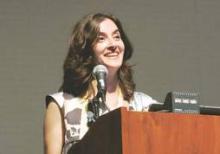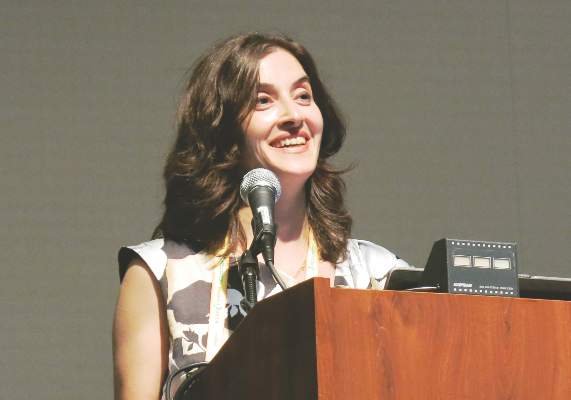User login
HONOLULU – Infertility may be as common among ob.gyn. residents as in the general population, and their residency programs may be providing little support for the problem, a survey of 254 residents suggests.
Investigators e-mailed a Web-based cross-sectional survey to all 233 ob.gyn. residency programs accredited by the Accreditation Council for Graduate Medical Education (ACGME) and received 254 of a possible 5,168 responses, for a 5% response rate.
Of the 220 respondents who answered questions about infertility, 18 (8%) reported experiencing fertility problems themselves. Previous data suggest an infertility prevalence of 9%-18% in the general population, Dr. Lusine Aghajanova and her colleagues reported at the annual meeting of the American Society for Reproductive Medicine.
Of the 18 residents reporting infertility issues, 14 said they sought treatment. The remaining four respondents said they could not afford treatment or did not have time to get it, according to Dr. Aghajanova of the University of California, San Francisco.
Eight of the 14 residents who sought treatment attempted in vitro fertilization and 3 attempted intrauterine insemination. A minority of respondents who sought help for infertility did so at the same clinic where they rotated as residents. More than a third of these respondents said their program administrators and coresidents were aware of their fertility problems, and more than a third reported stigma associated with their infertility.
A majority of respondents with infertility reported some or great difficulty in attending appointments for fertility services because of clinic schedules or other barriers, and only 3 of the 18 residents with fertility issues said they had good support from their residency program for the problem.
Ob.gyn. residents “should be considered a ‘population in need’ due to lack of program support and significant time constraints,” Dr. Aghajanova said.
Among the total cohort, 91% were female and 54% were younger than 30 years old, with 40% aged 30-35 years and the rest over 35. Fifteen percent said they were attempting conception. Twenty-nine percent reported that they had considered oocyte cryopreservation, but 2% had sought a consultation for this.
One physician in the audience questioned the generalizability of the survey results given the low response rate of 5%. Dr. Aghajanova suggested that the findings can be generalized, but with great caution.
Dr. Aghajanova reported having no financial disclosures.
On Twitter @sherryboschert
HONOLULU – Infertility may be as common among ob.gyn. residents as in the general population, and their residency programs may be providing little support for the problem, a survey of 254 residents suggests.
Investigators e-mailed a Web-based cross-sectional survey to all 233 ob.gyn. residency programs accredited by the Accreditation Council for Graduate Medical Education (ACGME) and received 254 of a possible 5,168 responses, for a 5% response rate.
Of the 220 respondents who answered questions about infertility, 18 (8%) reported experiencing fertility problems themselves. Previous data suggest an infertility prevalence of 9%-18% in the general population, Dr. Lusine Aghajanova and her colleagues reported at the annual meeting of the American Society for Reproductive Medicine.
Of the 18 residents reporting infertility issues, 14 said they sought treatment. The remaining four respondents said they could not afford treatment or did not have time to get it, according to Dr. Aghajanova of the University of California, San Francisco.
Eight of the 14 residents who sought treatment attempted in vitro fertilization and 3 attempted intrauterine insemination. A minority of respondents who sought help for infertility did so at the same clinic where they rotated as residents. More than a third of these respondents said their program administrators and coresidents were aware of their fertility problems, and more than a third reported stigma associated with their infertility.
A majority of respondents with infertility reported some or great difficulty in attending appointments for fertility services because of clinic schedules or other barriers, and only 3 of the 18 residents with fertility issues said they had good support from their residency program for the problem.
Ob.gyn. residents “should be considered a ‘population in need’ due to lack of program support and significant time constraints,” Dr. Aghajanova said.
Among the total cohort, 91% were female and 54% were younger than 30 years old, with 40% aged 30-35 years and the rest over 35. Fifteen percent said they were attempting conception. Twenty-nine percent reported that they had considered oocyte cryopreservation, but 2% had sought a consultation for this.
One physician in the audience questioned the generalizability of the survey results given the low response rate of 5%. Dr. Aghajanova suggested that the findings can be generalized, but with great caution.
Dr. Aghajanova reported having no financial disclosures.
On Twitter @sherryboschert
HONOLULU – Infertility may be as common among ob.gyn. residents as in the general population, and their residency programs may be providing little support for the problem, a survey of 254 residents suggests.
Investigators e-mailed a Web-based cross-sectional survey to all 233 ob.gyn. residency programs accredited by the Accreditation Council for Graduate Medical Education (ACGME) and received 254 of a possible 5,168 responses, for a 5% response rate.
Of the 220 respondents who answered questions about infertility, 18 (8%) reported experiencing fertility problems themselves. Previous data suggest an infertility prevalence of 9%-18% in the general population, Dr. Lusine Aghajanova and her colleagues reported at the annual meeting of the American Society for Reproductive Medicine.
Of the 18 residents reporting infertility issues, 14 said they sought treatment. The remaining four respondents said they could not afford treatment or did not have time to get it, according to Dr. Aghajanova of the University of California, San Francisco.
Eight of the 14 residents who sought treatment attempted in vitro fertilization and 3 attempted intrauterine insemination. A minority of respondents who sought help for infertility did so at the same clinic where they rotated as residents. More than a third of these respondents said their program administrators and coresidents were aware of their fertility problems, and more than a third reported stigma associated with their infertility.
A majority of respondents with infertility reported some or great difficulty in attending appointments for fertility services because of clinic schedules or other barriers, and only 3 of the 18 residents with fertility issues said they had good support from their residency program for the problem.
Ob.gyn. residents “should be considered a ‘population in need’ due to lack of program support and significant time constraints,” Dr. Aghajanova said.
Among the total cohort, 91% were female and 54% were younger than 30 years old, with 40% aged 30-35 years and the rest over 35. Fifteen percent said they were attempting conception. Twenty-nine percent reported that they had considered oocyte cryopreservation, but 2% had sought a consultation for this.
One physician in the audience questioned the generalizability of the survey results given the low response rate of 5%. Dr. Aghajanova suggested that the findings can be generalized, but with great caution.
Dr. Aghajanova reported having no financial disclosures.
On Twitter @sherryboschert
AT 2014 ASRM

